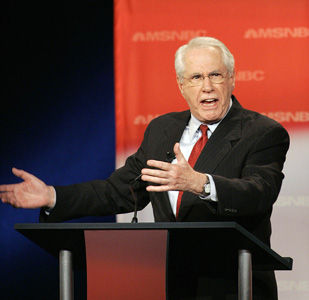In yesterday’s Huffington Post, publicist Lissa Warren expressed her dismay in “the seemingly widely-held notion that these book sections are being adequately replaced by blogs.” She complained that blogs “don’t actually review books” (emphasis in original) and that bloggers are nothing more than helpful cherry pickers ferreting out the best content.
This, of course, is poppycock. Scott Esposito continues to turn out issues of The Quarterly Conversation and is now making efforts to pay his contributors. Aside from the almost two hundred hours of podcasts available at The Bat Segundo Show, this website has featured many lengthy roundtable discussions of books, running during the week of pub date, including T.C. Boyle’s Talk Talk, Richard Powers’s The Echo Maker, and Nicholson Baker’s Human Smoke. (Powers and Baker both joined in during the final installments of their respective roundtables.) The Human Smoke discussion alone generated some 20,000 words of commentary among fifteen people, with asides on second generation Holocaust historians, World War I history, and sundry topics. This week, Talking Points Memo is featuring a lengthy discussion on Joseph O’Neill’s Netherland. Meanwhile, Mark Sarvas has been allowing his readers to see what goes into the writing of a review. This summer, Colleen Mondor helped to organize the Summer Blog Blast Tour (far from the first of this type), which featured a comprehensive series of helpful discussions about contemporary YA titles that even the purportedly best book review sections have not broached because of innate genre prejudices.
Do these efforts represent a replacement for book review sections? Well, if one hopes to find a facsimile of book review sections online, probably not. But it would take an exceptionally rigid and incurious mind to settle merely on a clone. If one wishes to discover forms of literary commentary that serve the same function as a book review section, it is extremely difficult not to find online exemplars in alternative forms.
Warren’s complaints about litblogs fall into the same tired explanations that have been bandied about by the likes of Sven Birkerts, Michael Dirda, and numerous other myopists who are incapable of accepting an alternative that has been carrying on for a good five years. The objections are less about function, or even the content (conveniently, examples of the litblogs’s inadequacies are never cited by the naysayers), and more about form and especially control. Impulsive thought cannot be accepted because it remains impulsive. Never mind that many newspaper book sections, because of the deadline-oriented nature of the business, remain somewhat impulsive and often fail to include numerous examples from the text when considering a book. (Consider, for example, Charles Taylor’s review of Uwem Akpan’s Say You’re One of Them, which appeared in Sunday’s New York Times Book Review. We are afforded a summary of Akpan’s offerings. But despite having 1,200 words of space, Taylor only cites a few sentences from the novella, “Luxurious Hearses.” Taylor prefers generalized speculation about the book, rather than the kind of rigorous dissections of text that one expects of a critic.)
The print boosters remain hostile to the idea that an online medium can not only modify the manner in which critics and readers approach a book, but generate innovative methods of expanding one’s relationship to a text. So litblogs are deemed inferior not necessarily because the content is inferior, but because there are doubts about the methods and manner in which litblogs transmit information.
I will agree that if one is looking for the online equivalent of the New York Times Book Review, it’s simply not going to be found on litblogs. And that is because most litblogs, on the whole, aren’t interested in perpetuating a form of literary journalism that, while often quite valuable, has grown tiresome and often predictable. And it is the unpredictablity and spontaneity of litblogs that offer both a literary renaissance and a threat to those who wish to uphold print’s humorless and oft passionless status quo.
On Monday, I posted a lengthy lexicon of very specific Yorkshire dialect terms used in Ross Raisin’s novel, God’s Own Country (known in the States as Out Backward). It was an effort not only to aid my own understanding of Raisin’s book, but also to assist other readers in negotiating the fascinating linguistic terrain of a novel that, according to a recent Google News search, has only been reviewed in one American news outlet: a 200 word “verdict” and “background” in the Library Journal. The book was a finalist for the Dylan Thomas Prize. This failure on the part of American print outlets to include Raisin’s novel in a timely manner suggests considerable print deficiencies.
The Raisin example also suggests that litblogs are not only covering books that are ignored by the seemingly impeccable vanguard, but that litblogs are presenting new forms of coverage that are inconceivable to Sam Tanenhaus and, yes, even a dutiful reformer like David Ulin. Unprohibited by length and unhindered by house style or crazy billionaires who don’t know how to run a newspaper empire, litblogs are in a position to change the journalistic terrain, possibly usurping freelance reviewers if a comparable revenue model can be established.
While I disagree with Kassia Krozser’s assertions about gender imbalance at the Los Angeles Times Book Review for reasons similar to Carolyn Kellogg’s (disclosure: I am an occasional contributor to the Los Angeles Times), Ms. Krozser is correct to point out that the hand-wringing about book review cuts has indeed represented a sense of entitlement. Not a single books editor, litblogger, or freelance reviewer is entitled to the lives they lead. At the end of the day, it’s a matter of generating content that will ensure that the writer can carry on writing. But if one operates on a smaller scale, then the financial obligation is seriously reduced (assuming that one wishes to make this sort of life one’s center) and the writer’s freedom to write in any fashion is greatly augmented.
So perhaps what we’re really seeing here is a situation in which the leading online voices will carry on doing what they are doing, with the unusual and passionate voices prohibited by the constant scrutiny of newspaper executives, precisely because the financial demands of supporting one individual are lesser than the costs and overhead of running a large newspaper or magazine. As Howard Junker observed yesterday, ad sales for the Atlantic have declined 11% in the last month. For Vanity Fair, the sales were considerably more severe, dropping a whopping 49%. With print advertising starting to dip, the onus now falls upon newspapers and magazines to either (a) increase advertising to support current operating costs or (b) reduce operating costs to bring the outlet in line with the reduced advertising. But if newspapers and print boosters will remain obdurate about these apparent online yahoos, the onus also falls upon litbloggers to find sustainable revenue models that will permit them to operate independently.
I should observe that the cost of a full-page advertisement in People Magazine is $250,000. I cannot speak for other bloggers, but it is safe to say that I could live off of this sum for a good five years and be relatively happy. I think it’s also safe to say that the money could also be allocated to other writers to turn in high quality freelance reviews for this site. Now imagine if a People advertiser wised up to this idea and decided to sponsor me (or another blogger) for five years. The People full-page advertisement fades away from public consciousness in a week, but the advertisement would run here for five years to a more limited, but very specific niche audience. Because there is only one sponsor, my editorial integrity would be fairly well preserved and I wouldn’t have to fear upsetting many sponsors who keep a big newspaper operation afloat. I would not need to always pander to a mass audience by reviewing the latest by a big name author. Small press and genre authors tossed out with the galleys deemed extraneous could be included with the same rigor that a newspaper grants the celebrated big names. Gender imbalances, whether genuine or perceived, could be greatly remedied.
If enough bloggers were to initiate an advertising scenario along these lines, it is safe to say that blogs could adequately replace newspaper book review sections, adopting both the form of the well-considered essay featured in book review sections as well as many alternative forms now practiced and conjured up by current litbloggers. I don’t know if the newspapers have discussed this possibility, and I don’t know how many litbloggers have truly considered this ambition. But the time has come to set a precedent. If this does occur — and it just might — then it may very well be the print contributors who begin coming around to the online venues. Let us not respond with the same snobbery and entitlement.
 Proving once again that its editorial team now prefers thoughtless and narcissistic essays over writing that chronicles the human condition, the Atlantic has commissioned Ann Patchett to throw a pity party about book tours. Look, if you’re an author and you can’t be bothered to have a bit of fun with a book tour, then you should either (a) insist on no book tours (as Denis Johnson and John Twelve Hawks have) or (b) stop bitching and moaning. Unless you suffer from Asperger’s or a Napoleon-like hubris, it takes exceptionally little skill to listen to someone and to remain patient even when a person has a predictable question that you’ve been asked four hundred times. (And besides, people are damn interesting, even when they ask obvious questions.) If you have any kind of brain, you can turn that question around into something complex and get the reader to think differently. A novel of yours from six years gets discussed? Tough titty, sweetheart. Once you’ve released the books to the public, they are no longer yours. Works you may deem greater or more significant won’t necessarily be what the audience deems greater or more significant. And what’s wrong with that? I don’t care if you’ve won the PEN/Faulkner or the Nobel. If you can’t appreciate the privilege of a literary life, then you deserve all the flack you get.
Proving once again that its editorial team now prefers thoughtless and narcissistic essays over writing that chronicles the human condition, the Atlantic has commissioned Ann Patchett to throw a pity party about book tours. Look, if you’re an author and you can’t be bothered to have a bit of fun with a book tour, then you should either (a) insist on no book tours (as Denis Johnson and John Twelve Hawks have) or (b) stop bitching and moaning. Unless you suffer from Asperger’s or a Napoleon-like hubris, it takes exceptionally little skill to listen to someone and to remain patient even when a person has a predictable question that you’ve been asked four hundred times. (And besides, people are damn interesting, even when they ask obvious questions.) If you have any kind of brain, you can turn that question around into something complex and get the reader to think differently. A novel of yours from six years gets discussed? Tough titty, sweetheart. Once you’ve released the books to the public, they are no longer yours. Works you may deem greater or more significant won’t necessarily be what the audience deems greater or more significant. And what’s wrong with that? I don’t care if you’ve won the PEN/Faulkner or the Nobel. If you can’t appreciate the privilege of a literary life, then you deserve all the flack you get. 

 Correspondent: A question to both of you. The modifier that frequently ripples, so to speak, throughout this book in relation to war is “unnecessary.” You question Woodrow Wilson’s motives for getting us into World War I, writing that America was not threatened. Yet I must bring up the bombing of the Lusitania. And I must also point out that there was the Kingsland Explosion. The Zimmerman telegram. I mean, what is a necessary war? Was America really not at threat in World War I? Is this what you’re saying?
Correspondent: A question to both of you. The modifier that frequently ripples, so to speak, throughout this book in relation to war is “unnecessary.” You question Woodrow Wilson’s motives for getting us into World War I, writing that America was not threatened. Yet I must bring up the bombing of the Lusitania. And I must also point out that there was the Kingsland Explosion. The Zimmerman telegram. I mean, what is a necessary war? Was America really not at threat in World War I? Is this what you’re saying?
 Correspondent: But not every man, Faye, is going to sit down and slap thousands of dollars wanting to get laid like this.
Correspondent: But not every man, Faye, is going to sit down and slap thousands of dollars wanting to get laid like this.